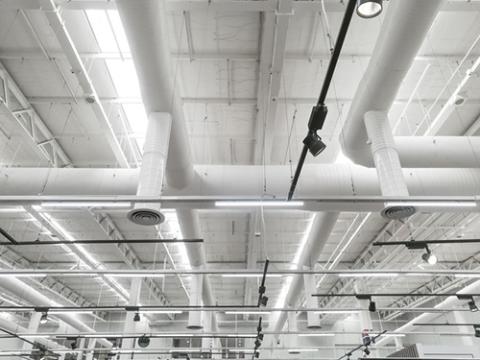Using Technology to Increase Air Quality — and Keep Shoppers Safe

Even with a new variant complicating the COVID-19 pandemic, most businesses are fully open and in-person shopping is in full swing. But COVID-19 is only one of the challenges facing retailers: With tight margins and supply chain disruption, retailers must provide a safe and positive shopping experience to attract shoppers who might otherwise feel inclined to shop from home.
This raises the question: How can brick-and-mortar stores compete with online shopping during the winter, given their unique safety and environmental challenges, and the costs of maintaining these physical spaces?
Heating, ventilation and air-conditioning systems are responsible for the monitoring and management of conditions and indoor air quality, making them a critical piece of the building operations puzzle. But legacy HVAC systems prevent businesses from doing this, which also contributes to business risk.
Here are just a few ways HVAC systems can play a larger role in creating better shopping experiences, while also increasing profits:
1.Keeping shoppers comfortable and safe can help boost profits. We all know the feeling of rushing through a parking lot to escape Jack Frost’s icy bite, only to peel off every layer possible as you move through the aisles of a sweltering and stuffy store. This year, this challenge goes beyond simple discomfort.
Retail locations that are overheated and have limited air circulation can create the impression of poor air quality - making COVID-19 transmission more likely, something that 40% of consumers have reported feeling anxious about when shopping indoors. Now more than ever, actions taken to protect shoppers will be just as important as visual merchandising in the effort to get people offline and through the doors of retail locations.
By upgrading HVAC systems with intelligent building automation technology, brick and mortar retail businesses can maintain comfortable temperatures and monitor air quality, regardless of shifting customer and employee patterns. Providing a safe and comfortable store environment helps build brand loyalty, keeps customers in stores for longer and inspires return trips - boosting profits from in-person sales.
2. The increases in extreme weather events is making energy prices volatile. We are feeling the impact of climate change across industries. Extreme weather events - hurricanes and tornadoes, freezes and snowstorms, floods and droughts - can spell financial disaster for businesses. During climate crises, energy sources can become more scarce, leading to volatility in utility prices, slowing the ongoing economic rebound from COVID-19.
For example, last February during the “Texas Freeze,” electricity prices surged to a whopping $9,000 per megawatt-hour. Businesses that rely on electricity to operate and stay afloat were left with insurmountable utility bills. The power grid in Texas remains vulnerable, putting homeowners and businesses at risk of rising utility bills or even no power at all. More universally, surging oil and gas prices are driving higher energy prices for everyone.
Given the growing uncertainty, businesses everywhere should rethink the way they use energy. Upgrading a building’s HVAC system can reduce energy consumption and risk, protecting businesses against some of the negative impacts of extreme weather.
3. Improving energy efficiency helps the planet while protecting businesses and boosting bottom lines. Energy consumption drives significant costs to bottom lines and to our environment. Commonly used HVAC systems account for approximately 40% of the energy used in commercial buildings. These systems put businesses at risk of financial hardships due to extreme weather and energy supply chain vulnerability. They also make it even more challenging for businesses to comply with environmental regulations and guidelines.
But businesses can upgrade their HVAC systems by retrofitting them with efficient, intelligent motor system technology, which can result in significant energy savings, with some systems providing up to 60% savings.
The Business of Sustainability Index has reported that 78% of people are more likely to purchase a product that is clearly labeled as environmentally friendly and 7% of Americans are concerned about the environmental impact of products they buy. With consumers demanding that companies implement more sustainable practices, retrofitting your HVAC system with a more energy-efficient model can make your products or services more attractive to consumers.
By upgrading to intelligent building automation systems, businesses can keep customers safe and comfortable, protect themselves against the risks associated with extreme weather events, and decrease their carbon footprint to meet compliance regulations, all of which boost and protect bottom lines. By checking their HVAC systems, retailers will come out of this winter stronger than ever.





